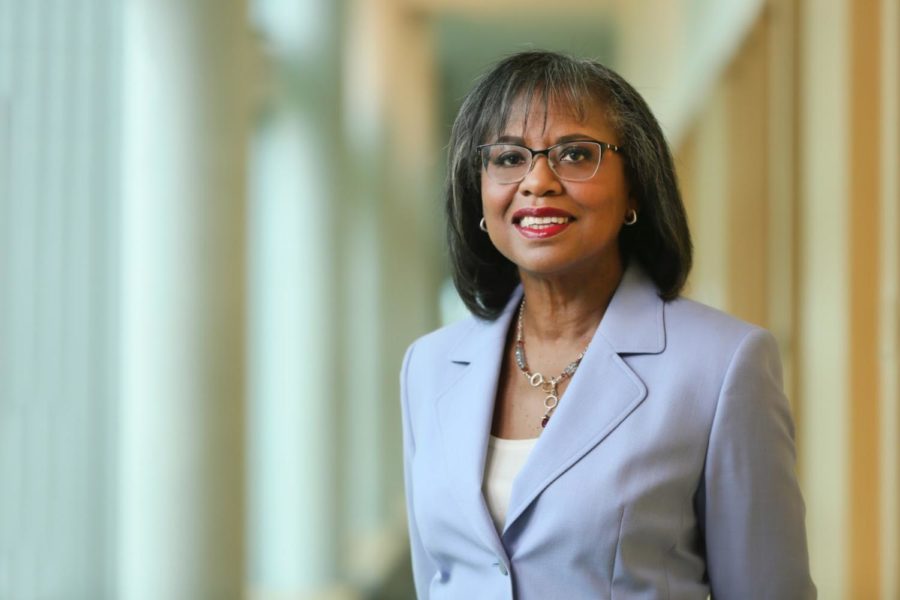Anita Hill, activist for sexual assault survivors, visits CWRU
Courtesy of Mike Lovett/Brandeis University
As one of their many events taking place during Women’s Week, the Flora Stone Mather Center for Women invited attorney Anita Hill who has been influential in changing the discourse of sexual misconduct.
March 24, 2023
In celebration of Women’s Week through the Flora Stone Mather Center for Women, Case Western Reserve University students welcomed Anita Hill to campus on Wednesday, March 22. In the 32 years since Hill gave riveting testimony accusing then-Supreme Court nominee Clarence Thomas of sexual harassment, she has become an activist, writer and professor at Brandeis University. Now she is a celebrated guest at CWRU and gave a speech at Maltz Performing Arts Center (MPAC).
However, Hill is more than just her titles; her testimony before the U.S. Senate Judiciary Committee in 1991 changed how we discuss sexual violence in America. Because of her bravery, anti-sexual assault movements including #MeToo gained momentum, causing a surge of female politicians and other women to feel more comfortable speaking out against powerful men abusing their power via sexual assault, harassment and misconduct cases.
Following the incident, Hill practiced law both privately and publicly, taught at various higher educational institutions, authored a book and received seven honorary degrees from several colleges and universities.
The talk began at MPAC with a few remarks from CWRU President Eric Kaler as well as an introduction by Dr. Angela Clark-Taylor, executive director of the Flora Stone Mather Center for Women. During the introduction, Dr. Clark-Taylor spoke on Hill’s accomplishments and life mission, saying that “Finally, [Hill will] demand that America see gender-based violence as a cultural and structural problem that hurts everyone, not just survivors, and she invites all of us to be part of a collective solution.”
Hill took the stage shortly after, offering short remarks and thanks to those sponsoring the event. Quickly, Hill introduces the purpose of her talk, stating “And I know that somebody out there is saying, but didn’t you lose?” She continued, “After all, you know, he won, he’s there. You’re not. And so tonight, what I have tasked myself to do is to show you that I didn’t lose. And to explain why I didn’t lose.” Here, she refutes rumors that she “lost” her battle against sexual assault when Justice Thomas joined the Supreme Court, despite her brave testimony in front of the Senate.
After discussing the aftermath of her testimony, Hill took the stage to educate others on how to approach and handle women who come forward and speak of their trauma, stating it is important to “treat them as full human beings. We are more than plaintiffs. We’re more than witnesses and dramas created by others. And we are certainly more than victims. We must be treated with dignity and respect. And our stories and our narratives of our own experiences need to be honored.”
The rest of Hill’s talk combined inspirational messaging with personal stories, both about herself and her associates. In addition, Hill also acknowledged the strides that have been made since her initial testimony in 1991, as well as the importance of speaking out and how that can positively impact so many others.
“You have to be able to tell your story to someone,” Hill said, “And we are [doing just that] today. Those telling the stories can change lives, not only your life, but the lives of others. I’ve heard countless of those individual stories that have been told around the kitchen table, especially in 1991, that have changed the way people look at the problems that women and girls face when they go out into the world…especially when they’re out in the world on their own.”
Her transparency and honesty in speaking on her sexual assault experience publicly has been instrumental in driving a conversation around gender disparities that only continues to grow more relevant.
In her words, “We have moved forward, we are continuing to grow. The conversation is not over. For those of us who hear the question all the time ‘Has any progress really been made since 1991?’ I hope that all of us here will think back on all of the developments that have happened since 1991. And understand and say and answer that question by saying, yes, there has been change, and there will continue to be change.”



